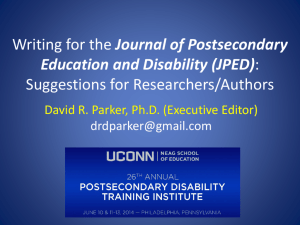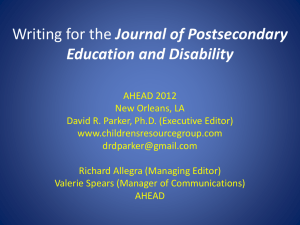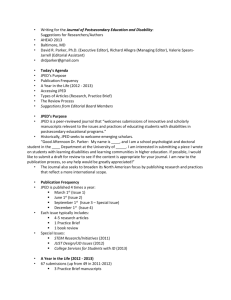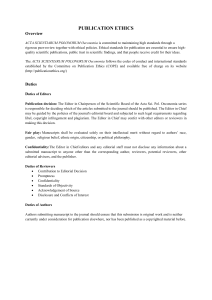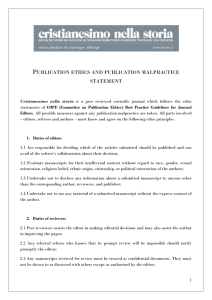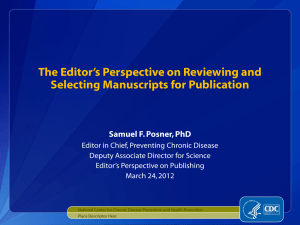Writing for JPED: Suggestions for Researchers/Authors
advertisement
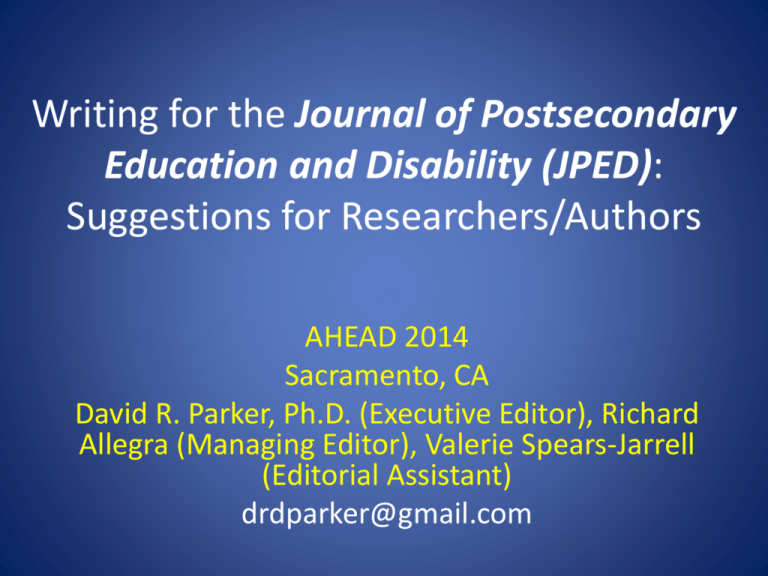
Writing for the Journal of Postsecondary Education and Disability (JPED): Suggestions for Researchers/Authors AHEAD 2014 Sacramento, CA David R. Parker, Ph.D. (Executive Editor), Richard Allegra (Managing Editor), Valerie Spears-Jarrell (Editorial Assistant) drdparker@gmail.com Today’s Agenda • • • • • • • JPED’s Purpose Publication Frequency A Year in the Life Accessing JPED Types of Articles (Research, Practice Brief) The Review Process Suggestions from Editorial Board Members JPED’s Purpose • JPED is a peer-reviewed journal that “welcomes submissions of innovative and scholarly manuscripts relevant to the issues and practices of educating students with disabilities in postsecondary educational programs.” • Historically, JPED seeks to welcome emerging scholars. “Good Afternoon Dr. Parker: My name is ____, and I am a school psychologist and doctoral student in the ____ Department at the University of _____. I am interested in submitting a piece I wrote on students with learning disabilities and learning communities in higher education. If possible, I would like to submit a draft for review to see if the content is appropriate for your journal. I am new to the publication process, so any help would be greatly appreciated!” • The Journal also seeks to broaden its North American focus by publishing research and practices that reflect a more international scope and increasing the international composition of its editorial review boards. Publication Frequency • JPED is published 4 times a year: o March 1st (Issue 1) o June 1st (Issue 2) o September 1st (Issue 3 – Special Issue) o December 1st (Issue 4) • Each issue typically includes: o 4-5 research articles o 1-2 Practice Briefs o 1 book review • Special Issues: o JUST Design/UD Issues (2012) o College Services for Students with ID (2013) o 30 Years of JPED: Publishing Trends (2014) A Year in the Life (2013 - 2014) • Typically 2 issues “in the wings” ready for publication • 60 submissions received between 7/13 and 7/14 o 52 Research/Policy manuscripts o 6 Practice Brief manuscripts o 2 were book reviews • 6 returned to author; 11 rejected; 9 published/inpress; 15 being revised; 19 under review • 10 non-U.S. manuscripts – – – – 5 Canadian 3 from the U.K. 1 Germany 1 Spain A Year in the Life • Summer 2013 – JPED Editor represented AHEAD at 8th International Conference on Higher Education and Disability (Innsbruck, Austria) o JPED poster session; networking o 5 new international editorial board members o 2015 Special Issue (Prof. Alan Hurst; UK) • Summer 2014 – Review of the Year o New annual awards o One research ROTY; one Practice Brief o Nominated by editor; selected by former editors • Fall 2015 – New selection process for JPED Editor o Application materials due by October 1st o Selection committee decision (December 15th) o Spring 2015: transition meeting with current, incoming JPED editor Accessing JPED • The Journal continues to be provided as a benefit of membership. Print copies an additional $50.00/year. Switch to universally-accessible formats in Fall 2010, including: o o o o DAISY, text, mp3 audio, and PDF versions text mp3 audio PDF • JPED is searchable through ERIC online and libraries that subscribe to the EBSCO "Education Research Complete" database. • Back issues of all JPEDs are available: http://www.ahead.org/publications/jped Research Articles • Research: Original quantitative, qualitative, or mixed-method research (25 – 35 pages) • Integration: Integrate research of others, compare/contrast theories, critique results, and/or provide context for future exploration • Innovation: Propose new theory, approach, or service delivery model based on review of research/literature • Policy Analysis: Analyze, critique, or present implications of public policy, statutes, regulation, and litigation Recent Research Articles • University and Disability: An Italian Experience of Inclusion o Silvia Maggiolini & Paola Molteni (26/3) • Postsecondary Education for Students with Intellectual Disability (ID): Complex Layers o Colleen A. Thoma (26/4) • One Woman’s Experience o Melissa Myers, Judy E. MacDonald, Sarah Jacquard, Matthew Mcneil (27/1) • Effects of an Intensive Disability-Focused Training Experience on University Faculty Self-Efficacy o Christopher Murray, Allison Lombardi, John R. Seeley, & Hilary Gerdes (27/2) Practice Briefs • Practical strategies and programs used to support postsecondary students with disabilities. Limit the Body to 12 pages (including separate title page, abstract, and references). Tables/figures may be added beyond the 12 page limit. • • • • • • • • • • Title page Abstract Literature Review Depiction of the Problem Participant Demographics/Institutional Partners or Resources Description of Practice Observed Outcomes Implications/Portability References Tables and Figures (if needed) Recent Practice Briefs • Transforming Barriers into Bridges: The Benefits of a Student-Driven Accessibility Planning Committee o Stephanie J. Cragg, Kristina Nikolova, & Irene Carter (26/3) • Interdisciplinary Collaborative Support Services for Students with Autism Spectrum Disorders o Susan Longtin (27/2) • Assessing the Impact of Inclusive Postsecondary Education Using the Think College Standards o Kathleen Bodisch Lynch & Elizabeth Evans Getzel (26/4) The Review Process 1) Send manuscript (single Word document, including title page, abstract, and appendices) and cover email to jped@ahead.org. 2) Managing Editor (Richard Allegra) confirms receipt; posts on JPED server. 3) Executive Editor (David Parker) determines if manuscript should be reviewed. 4) Two reviewers conduct “blind” review. a. Recommendation (publish?) b. Areas of weakness (Literature review; Relevance; Methodology; Findings supported by data; APA formatting…) c. Comments/suggestions The Review Process 5) Editor shares decision with lead author via email (Reject, Revise/resubmit, Accept with minor editing, Accept as is). a. Synthesis of reviewers’ comments b. Highlight the most important areas of feedback; additional suggestions * Do not take comments personally. Feedback generally implies an interest in publication or can help you publish in another journal. c. Deadline for receiving revised copy 6) Editor may send revised version back to reviewers; offers his own editing suggestions. 7) After acceptance, Valerie Spears requests bio and Permission Form from authors. 8) Valerie proofreads/checks APA formatting and sends galley proof to lead author. Suggestions from Reviewers • Recommendations from the experts • Q&A Session Thank you for your interest in writing for JPED.
